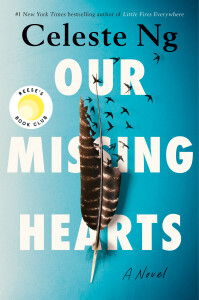
Twelve-year-old Noah Gardner receives a letter from his mother, who disappeared several years earlier. It has been opened by the authorities of course, and is covered with drawings of cats. Noah and his father, formerly a linguistics professor but now demoted to a janitor, live in a U.S. that shows what our current country could easily become.
A global crisis has lessened the country’s standing in the world, and in response, the government has created PACT, the Preserving of American Cultures and Traditions Act. The increasingly authoritarian government rigidly enforces PACT, indoctrinating children young, tolerating no dissent, and cracking down on any resistance. Because China is blamed for the crisis (sound familiar?), all east Asian people, even longtime citizens, are subjected to racial violence and discrimination.
Noah decides to find out once and for all what happened to his mother, a famous Chinese-American artist. He loves his white American father, yet wonders why the man allowed himself to be punished for whatever his wife had done. Noah isn’t even allowed to go by the nickname his mother gave him: Bird. It’s not hard to imagine the effect on a child’s identity when he loses the name he’s always been known by.
This is a fascinating story, part mystery, part thriller, part social commentary. Several choices by the author add to its power: putting current social/political tensions into a mostly fictional world, and concentrating the terrible racist abuse on Asians rather than people of color—not that it doesn’t exist now but not so blatantly and virulently—provides a little distance for the reader. We recognise them and can more easily appreciate how these fictional forces play out in today’s society. For example:
In Orange county a march protesting anti-Chinese bias spiraled into a clash with bystanders hurling epithets, ending with riot police, Tasers, a Chinese-American three-year-old struck with a teargas canister. For the officers, paid leave; for the protester, a full investigation into the family.
We can also see where our real world tensions could lead. More and more people are embracing the idea of an authoritarian regime, without actually understanding what that will mean for them. Like Octavia Butler’s Parable of the Sower, this dystopia is all too close to reality.
I love the descriptions of the protests in the novel. They are sometimes enigmatic and often playful, adding a touch of humor and reminding me of the Yippies’ protests in the 1960s. Most of them reference a phrase from a poem by Noah’s mother: our missing hearts. It’s a brilliant symbol, which accrues meaning as the novel progresses.
Even more, I love the role librarians play. I believe librarians are the smartest people around. They are my heroes. I appreciated Noah’s father and the sacrifices he makes to protect his family. I also liked Noah’s feisty friend Sadie. And I loved the way he used the stories and folktales his mother had told him when he was little. Through these characters, Ng delves into the power of stories, who gets to tell them, and what happens when people are silenced.
When are you ever done with the story of someone you love? You turn the most precious of your memories over and over, wearing their edges smooth, warming them again with your heat. You touch the curves and hollows of every detail you have, memorizing them, reciting them once more though you already know them in your bones. Whoever thinks, recalling the face of the one they loved who is gone: yes, I looked at you enough, I loved you enough, we had enough time, any of this was enough?
Wondering why his mother left, where she is, and whether Noah will succeed kept me glued to the book. True, parts of it dragged; the emotional lives of the characters could have been more fully developed; and there were a couple of consistency problems near the end. Overall, though, it is a brilliant book, and a worthy follow-up to Ng’s Little Fires Everywhere.
What dystopian novel have you read that seemed disturbingly close to our world?
